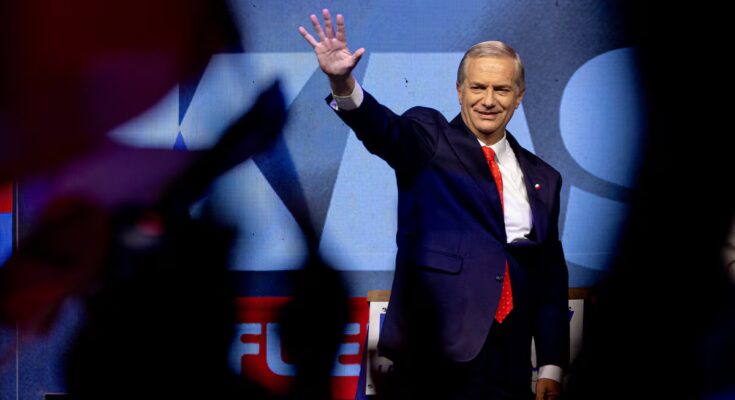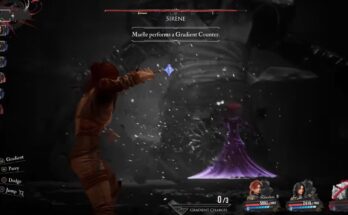Chile’s far right found itself on Sunday in an unbeatable position to win the Presidency of the Republic between 2026 and 2030. The candidate of the Republican Party, the ultra-conservative José Antonio Kast, obtained 23.9% of the vote, just three points below the only candidate of the official left, the communist Jeannette Jara, who achieved the first majority with 26.8%. Jara’s problem was not to come first – all the polls predict this – but to obtain at least 30% of the support the government has, to face the second round on 14 December with any chance.
But Jara’s result is the worst the left has achieved since 1990, since the return to democracy. Kast, however, on the same night of the elections obtained the public support of the other two right-wing candidates: the libertarian, even more radical than the republican, embodied in Johannes Kaiser (13.9%) and the traditional right-wing candidate Evelyn Matthei (12.46%). Together they easily reach the 50% needed to win, while the left-wing candidate seems to have a maximum ceiling and great difficulty in growing. The far-right Kast road is asphalted to reach La Moneda on March 11.
In the four years of President Gabriel Boric’s government, the right has become radicalized. The moderate sectors of the opposition suffered a heavy defeat not only in the presidential elections, with Matthei relegated to fifth place out of eight candidates, but also in Parliament. Chile Vamos, which brings together the parties that led the transition from the opposition, had 53 deputies and in these elections it dropped to 34. That is, it lost 19 seats in the Chamber. The Republicans and their allies, however, celebrate: the Change for Chile pact, which he leads together with the Kaiser’s libertarians and the Social-Christian Party, has gone from 15 to 42 deputies. The two right-wing parties, the historic one and the extreme one, remain with 76 deputies in a chamber of 155. In the Senate, Kast’s forces go from one to seven senators. Together with the traditional right, which reaches 18, they will reach 25 senators out of 50. Hegemony remains in the hands of the ultra-conservatives.
In the hours following the vote, in Chile there is a question present in all the analyses: what should have happened in the Boric government, how many expectations must it have frustrated, so that its great legacy is that between Kast and Kaiser – two sectors that did not break away from the dictatorship of Augusto Pinochet – they reach 37%, more than 10 points above the only candidate of the left? “The Government and the Frente Amplio – the president’s party – will have a certain responsibility in this phenomenon, and it is something they cannot ignore,” says Daniel Mansuy, an academic at the Signos Center at the University of Los Andes. Jara’s fate seems linked to that of the Boric government – of which he was Minister of Labor – which comes to an end on 11 March with poor economic, social and security results. In his four years in office, the president corrected his initial path, moderated out of conviction or a sense of political reality, but was unable to convince large majorities who were concerned above all about crime, assaults and robberies.
Kast cleverly presents the second round as a referendum on Boric. “December 14 will be a plebiscite between two models of society,” he said in his speech on Sunday evening. He explained what he means by this: “A model, which is the one led by the current government, which has led to stagnation, violence and hatred. And ours, which speaks freely and promises hope for Chile. This is our great challenge: to save it from violence and hatred, always with respect for others,” said Kast, with important ties to the global far right. In this third candidacy, however, he has strategically chosen not to focus on the debate on individual freedoms – Kast is against abortion, for example – but on the offer of an “emergency government”. focused on the containment of public security problems, the control of immigration and the recovery of deteriorated social projects. He also proposed, without satisfactory explanation, cutting $6 billion in social spending in the first 18 months of a possible government.
Candidate Jara, meanwhile, is looking for supporters against time. In his speech on Sunday evening he winked at some of the candidates who lost and above all he appreciated some proposals from the populist Franco Parisi, who obtained a surprising third place with 19.71%, but who avoided supporting either of the two candidates who passed the ballot. “I have bad news for Kast and Jara. Win the votes, win the streets,” said Parisi, leader of the Popular Party, which declares itself neither fascist nor communist (“nor facho neither of them commonSymbol of anti-politics and of the great distrust of Chilean society towards democratic institutions, Parisi remained with 14 seats in the Chamber. His party will have an important role in the Congress of the next government, where the right is stronger than the left, but does not have the majorities necessary to reach the highest quorum.
“New elections begin today,” Jara said after Sunday’s results, which is what the left is betting on, at least publicly, even if this idea privately does not convince the parties that support it. “Let’s not forget how good we are as a country,” he added, responding to Kast’s speech, who based his political proposal on a pessimistic diagnosis of the Chilean reality and the urgent need for change. President Boric, from La Moneda Palace, congratulated the candidates who passed through to the second round on the evening of the elections and assured: “I trust that dialogue, respect and affection for Chile will prevail over every difference”. And he sent a message to Jara and Kast: “As head of state, I urge you to have a high-ranking debate, always thinking about what is best for Chile.”
In Chile we talk about the end of the cycle. In addition to the results of the presidential elections, which leave little room for the victory of the left-wing candidate, the parliamentary elections held in conjunction with the presidential elections also confirmed that the moderate currents, both right and left, have been replaced by more radical versions. The Republican Party triumphed together with its partners in both the Chamber of Deputies and the Senate. On the opposite side, however, the left of the Broad Front of President Boric and the Communist Party has overtaken the center-left or moderate left, grouped in Democratic Socialism, which constitutes the Socialist Party. The world of the defunct centre-left Concertación, which governed after the dictatorship between 1990 and 2010, weighs less than that new left emerged in Chile in the last decade. It is the configuration of the political system that must manage the new phase that opens in Chile, 35 years after the return to democracy, where for the first time an open supporter of Pinochet’s dictatorship has great chances of reaching La Moneda.
The right has a greater number of parliamentarians in the House and Senate than the left, but not enough to despise dialogue and turn its back on the search for agreements, one of the main difficulties of Chilean governments. It is, in part, the source of the boredom of a citizenry that sees no results for its urgent needs.



